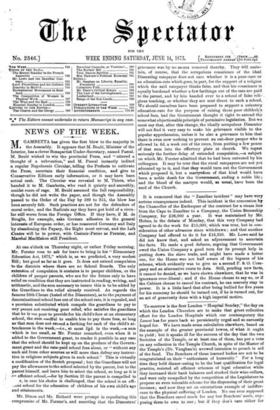Mr. Dixon and Mr. Richard were prompt in repudiating this
compromise of Mr. Forster's, and asserting that the Dissenters'
grievance was by no means removed thereby. They *ill main- tain, of course, that the scrupulous conscience of the ideal Dissenting ratepayer does not care whether it is a poor-rate or an education-rate which goes, in part, for the support of a religion' which which the said ratepayer thinks false, and that his conscience is equally burdened whether a few farthings out of the rate are paid to the parent, and by him handed over to a school of false reli-'. gious teaching, or whether they are sent direct to such a school. We should ourselves have been prepared to support a voluntary education-rate for the purpose of raising these poor childreb's school fees, had the Government thought it right to extend the somewhat objectionable principle of permissive legislation. But we must say that, after this change, the ideally scrupulous Dissenter will not find it very easy to make his grievance visible to the popular apprehension, unless it be also a grievance to him that there is even now nothing to prevent an out-door pauper who is allowed is. 6d. a week out of the rates, from putting a few pence of that sum into the offertory plate at church. We regret seriously the further delay of extended compulsion,—a subject on which Mr. Forster admitted that he had been outvoted by his colleagues. It may be true that the rural ratepayers are not yet educated up to it, and that they would turn out the Government which proposed it, but a martyrdom of that kind would have been a noble death for the Government, ending a noble life ; and the blood of the martyrs would, as usual, have been the seed of the Church.


































